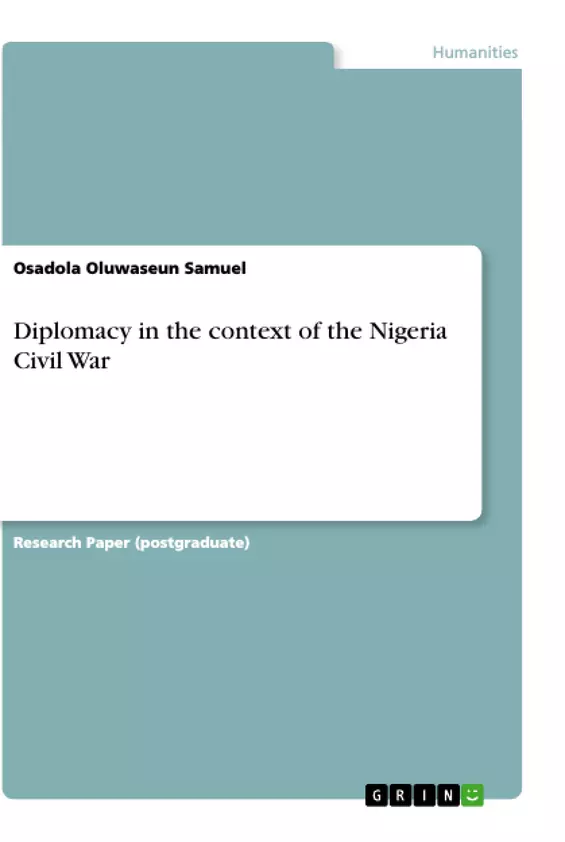War is the highest form of political struggle for resolving contradictions, when they have developed to a certain stage either between classes, nations, states or political groups. Hence, the rapport between war and peace is being determined by the approach or position of diplomacy. Since the failure of diplomacy usually laid the basis for the start of war, and after all wars, peace often reign, it is of enormous significance to recognize the important relationship between war and diplomacy. Like all civil wars, the Nigerian civil war was unique in the context of the nation’s history. This is because it was the most vivid expression of a country turned against itself. As with civil wars in other countries, the Nigerian civil war can be analyzed within the context of a failed diplomatic act. Hence, this paper discussed the position of negotiation or peace talk before and after the Nigerian civil war of 1967-1970. It has also looked at the general impact of diplomacy during the period of the crisis.
Inhaltsverzeichnis (Table of Contents)
- Introduction
- Causes of the Nigerian Civil War in Brief
- The Aburi Accord
Zielsetzung und Themenschwerpunkte (Objectives and Key Themes)
This paper examines the role of diplomacy in the context of the Nigerian Civil War (1967-1970). It aims to understand the effectiveness of negotiation and peace talks in preventing and resolving the conflict. The paper also analyzes the impact of diplomacy on the socio-political and economic life of Nigeria during the crisis.
- The causes and dynamics of the Nigerian Civil War
- The role of diplomacy in preventing and resolving the conflict
- The impact of diplomacy on the socio-political and economic landscape of Nigeria
- The significance of the Aburi Accord and its implications for the conflict
- The challenges and limitations of diplomacy in the context of civil war
Zusammenfassung der Kapitel (Chapter Summaries)
- Introduction: This chapter provides a background on the Nigerian Civil War, outlining its causes and contextualizing the role of diplomacy. It emphasizes the importance of understanding the relationship between war and diplomacy.
- Causes of the Nigerian Civil War in Brief: This chapter explores the various factors that led to the outbreak of the civil war, including colonial legacies, political instability, ethnic tensions, and the 1966 coup d'état and counter coup. The chapter also highlights the role of oil companies in the conflict.
- The Aburi Accord: This chapter focuses on the Aburi Summit, a last-ditch effort to prevent the escalation of the conflict. It analyzes the context, motivations, and outcomes of the accord, including the agreement for a return to true federalism and the challenges faced in implementing it.
Schlüsselwörter (Keywords)
Key terms and concepts include: Nigerian Civil War, Biafra, diplomacy, negotiation, peace talks, Aburi Accord, federalism, ethnic tensions, political instability, colonial legacy, oil companies.
- Quote paper
- Osadola Oluwaseun Samuel (Author), 2012, Diplomacy in the context of the Nigeria Civil War, Munich, GRIN Verlag, https://www.hausarbeiten.de/document/202625


